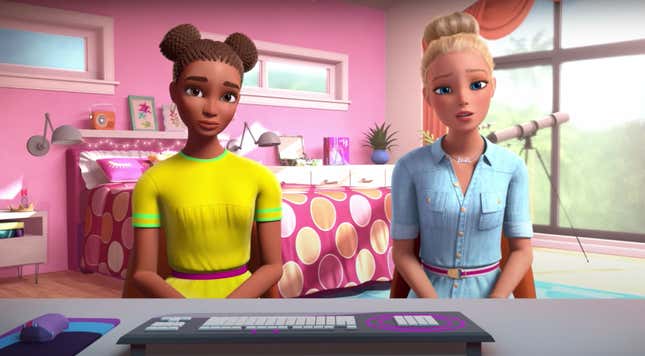
One of the more unfortunate but often obligatory aspects of raising Black children is “The Talk”—that painful yet often inevitable moment when Black parents and caregivers feel compelled to kill a little of their children’s innocence for the sake of their own protection. But how do well-meaning white parents prepare their children to recognize racism when they see it—and be proactive in combatting it, both internally and when they witness it occurring?
Thanks to the team at Mattel, none other than Barbie—yes, that Barbie—has entered the very necessary chat about race relations in America. On Wednesday, ahead of International Day of the Girl on Sunday, an animated version of the iconic toy invited her Black friend, “Nikki” to share her experiences of racism via the Barbie YouTube channel—kind of like “Share the Mic”—but with dolls.
Per a release provided to The Glow Up from Mattel:
As the most-watched series and #1 girls channel on YouTube, Barbie is using her platform to raise awareness around racism and encourage girls to stand up if they see a person treated unfairly. The format of the episode consists of Barbie’s friend Nikki talking about the racism she has personally felt and share some stories that may resonate with other girls.
The goal of the episode is to help girls to understand that there is a huge movement going on in the fight against racism, why people are marching together and the importance of reading and learning more about Black history. Barbie is championing gender equality to help close the racial injustice barrier girls face through the Dream Gap and this is one way the brand is addressing it.
We hope that families watch this together and leverage the brand to discuss a really tough topic with a young child and hope it spurs many more conversations on how girls can support one another.
“People might think that my life looks fine,” says Nikki in this ‘very special episode’ of Barbie’s vlog, simply titled “Barbie and Nikki Discuss Racism.” “But the truth is, I and so many other Black people have to deal with racism all the time. It’s really hurtful, and it can be scary and sad.”
Real talk—and though Nikki’s obviously not a real person, the anecdotes she shares actually offer some realistic examples of how racism shows up in overt and subtle (read: microaggressive) ways, as Barbie responds with the requisite righteous indignation of a true ally. It may seem a ridiculous premise—and even more ridiculous to try to tackle such a heavy, centuries-deep topic in under three minutes in the pink-on-pink-on-pink paradise that is Barbie’s bedroom, but as an age-appropriate primer on racism, we have to admit, it’s not badly handled.
“I don’t want to have to constantly prove and re-prove myself,” Nikki says of the inequities she faces, strumming our pain, singing our lives. “Usually when I talk about these things, people make excuses...But those are just excuses. People did these things to me because I was Black and they made the wrong assumptions about me.”
“But Barbie,” you ask, “Isn’t this content really tailored for white children?” After all, aside from the aforementioned “Talk,” Black children, unfortunately, have ample opportunity to understand how racism functions through their own lived experience and that of their loved ones; especially if they live in communities where they are automatically “othered.”
Yet, all too often, those experiences come as a shock to young systems far earlier than one might expect, placing caregivers in a reactive, rather than proactive position. Not to mention that we live in a climate and era in which too many of our young people are seeing Black bodies targeted and terrorized via their smartphones. With that in mind, perhaps the kinder, gentler approach Barbie is offering is exactly what the preschool and elementary school set need to recognize and acquire the language to identify racism when they see it—especially if and when it’s happening to them.

